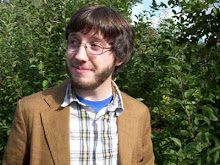When I'm writing, I sometimes think about the kinds of stories people wrote in undergraduate creative writing classes, the kinds that were autobiography so thinly veiled that it was difficult to think of them as "fiction." And I started thinking about what elements from real-life work their way into my stories, and I figured out something important about how I work: I am a thief and an arranger. I imagine that all of the anecdotes, all of the little bits of dialogue I pick up, end up on some shelf in my brain (or, if I'm being very organized about it, in my notebook). And all of these pieces, all of these discrete parts taken from friends, from family, from coworkers, from strangers, are each true in their own way. Even if I forget the details, or intentionally alter them later, each of them has some intentionally true piece in it.
An example: one of my favorite stories I've written featured an arson at a comic book shop. Now, my town has had a lot of arson, but never a comic book shop. So writing about it is a combination of memory and imagination, taking the meaningful images I've actually witnessed and trying to figure out what that street would look like as a comic shop smoldered (the half-burnt comic pages, the broken windows). But the reasons for the arson, the desperation that leads to someone destroying their business for the insurance money, are the truth. The story of the guy who lights the match because he thinks he'll improve his life is essentially true, even if it's made up. Or, for another story, the process may involve taking a story someone told me and changing the facts to fit a narrative shape and structure. The inspiration might be someone else's story, but I'm not interested in transcribing it. I want to find what's essential in that story, what it means and why they're telling it. I want the story underneath the story, even if it's wholly imagined after I've heard their version.
So when I say I'm a thief, I don't mean I literally steal. I'm not that German 17-year-old author who claims she's "mixing" instead of plagiarizing. I grab at things from real life, from newspaper articles, from overheard conversations. This is something all writers do, I think. The arranging, though, that's my favorite part. Finding strange overlaps and seeing if two disparate inspirations are really trying to tell a cohesive story. Working from something that happened years ago and utilizing a more recent real-life find to tie the story together. I love when several different inspirations influence the direction of a story, when a number of truths come together to form a really engaging and narratively cohesive lie. Or the details you pick up from day-to-day life become symbols in an entirely different story.
I'm really just rambling, here, because I'm working on a short story, and it's kind of strange how an idea comes back to life after it's been dormant for a very long time. Sometimes an event isn't clear, or the story you want to pull from the event is murky, until years after you've had that first idea. It can be such a long process, and I'm glad to be back in the middle of it.
Monday, February 15, 2010
Fiction Mondays: The Truth in Fiction
Labels:
Fiction Mondays,
Stories,
Writing
Subscribe to:
Post Comments (Atom)

No comments:
Post a Comment